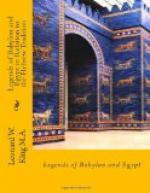(1) Cf. l. 121 f., “Since
I commanded evil in the assembly
of the gods, (and) commanded
battle for the destruction of
my people”.
(2) Cf. ll. 165 ff., “Ye gods that are here! So long as I forget not the (jewels of) lapis lazuli upon my neck, I will keep these days in my memory, never will I forget them! Let the gods come to the offering, but let not Enlil come to the offering, since he took not counsel but sent the deluge and surrendered my people to destruction.”
The lament of the goddess is followed by a brief account of the action taken by the other chief figures in the drama. Enki holds counsel with his own heart, evidently devising the project, which he afterwards carried into effect, of preserving the seed of mankind from destruction. Since the verb in the following line is wanting, we do not know what action is there recorded of the four creating deities; but the fact that the gods of heaven and earth invoked the name of Anu and Enlil suggests that it was their will which had been forced upon the other gods. We shall see that throughout the text Anu and Enlil are the ultimate rulers of both gods and men.
The narrative then introduces the human hero of the Deluge story:
At that time Ziusudu, the king, . . . priest of the god (. . .),
Made a very great . . ., (. . .).
In humility he prostrates himself, in reverence (. . .),
Daily he stands in attendance (. . .).
A dream,(1) such as
had not been before, comes forth(2) . . .
(.
. .),
By the Name of Heaven and Earth he conjures (. . .).
(1) The word may also be rendered “dreams”.
(2) For this rendering of the verb e-de, for which Dr. Poebel does not hazard a translation, see Rawlinson, W.A.I., IV, pl. 26, l. 24 f.(a), nu-e-de = Sem. la us- su-u (Pres.); and cf. Bruennow, Classified List, p. 327. An alternative rendering “is created” is also possible, and would give equally good sense; cf. nu-e-de = Sem. la su- pu-u, W.A.I., IV, pl. 2, l. 5 (a), and Bruennow, op. cit., p. 328.
The name of the hero, Ziusudu, is the fuller Sumerian equivalent of Ut-napishtim (or Uta-napishtim), the




